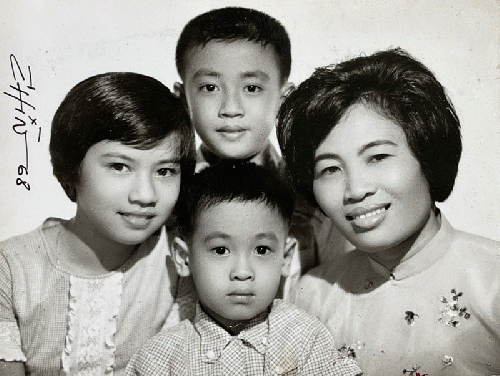From SubStack--On 1/27/22, a Vietnamese webzine, Tra' � � [Youth], published an interview of Tra' � �n V�... �, who is widely regarded as the finest Vietnamese prose writer of his generation. Most of his best writing has not been translated into French or English, however, for an obvious reason. It's too gorgeously embedded in its language for even a very skilled translator to mess with.
I was already in awe of Tra' � �n V�... � before I met him in northern Virginia around 1994, and to my surprise, he was completely unassuming. When men meet, they size each other up and, no matter how subtle, try to assert themselves, with their body and speech, to show they're at least an equal, and not some anxiety racked boy, fearful of ridicule and, well, just about everything else. Slightly built, Tra' � �n V�... � had a small, disarmed voice, without any ego driven strain.
A sure sign of a collapsed culture is men acting toughest when they risk nothing, with nameless and faceless ticks roaring like titans, with uncivility or bitchiness masking abject fear.
From Tra' � �n V�... �'s interview, "There are images that a young child can never forget. For me it's when my father died. Three days after Duong Van Minh surrendered, father vomited blood from anguish [ua' � �t]. The room filled with blood. Father lay still. I bawled and the adults yanked me away. He was driven to Grall Hospital and ten days later he died. The death of the South, to me, was the death of my father. I want to forget, but the room's still there."
To most Americans, the Vietnam War was about Uncle Sam as imperialist or defender of democracy, with all Vietnamese reduced to Communists or puppets, but there's a Vietnamese saying, "Nine men, ten opinions." Vietnamese were fighting among themselves even before the US got there, though Uncle Sam, as usual, was keen to exploit this divisiveness to his advantage, without benefiting any Vietnamese faction! That's just realpolitik 101. The American grunts sent there also got a very raw deal, of course. Like the South Vietnamese, they were just pawns. As always, the surest winners were the war profiteers.
Tra' � �n V�... � was 12-years-old when his father died. At 16, he escaped Vietnam on a barely seaworthy fishing boat. After roughly 500 miles in the Pacific, it hit a sand bank and nearly broke apart. Fearful the boat would capsize if the refugees were allowed on deck, the owner forced everyone, but himself and the skipper, to remain in the flooded hull.
Tra' � �n V�... �, "During the day the water reached our chests, by afternoon it lowered to our bellies and by evening to our thighs, but at night it rose past our heads. We clutched to wooden planks, ropes and each other tightly all night ["] We stayed in the water 13 days altogether. My skin wrinkled up like an old woman's. Luckily the ocean was warm and there was rain."
Rescued by a Filipino navy boat, Tra' � �n V�... � eventually ended up at an orphanage in northern France, where he had to fight, twice, with a bully, before being moved to a Center for Children in Great Difficulties. To his great surprise, it was filled with Vietnamese and Cambodian refugees, who even fought each other.
Brighter than the others, Tra' � �n V�... � was the only one to graduate from high school, then sent to college. Living in a group home for young workers [foyer des jeunes travailleurs], he was seduced by a Polish girl, but only after they had played chess for four months. So naà �ve, he missed all hints and even asked why she didn't cry after the act?
Surprised, Jadwiga asked back, "Why should I cry?"
It was my turn to be surprised, "In novels, after lovemaking, all the girls cry."
Jadwiga laughed out loud, "How weird! Which novels? Who wrote them?"
I was getting irritated, "Vietnamese novels. To make love is to give one's body. After giving her body, the girl cries."
Laughing so hard, Jadwiga grabbed her belly, "I want to cry for you to make you happy but you're cracking me up!"
(Note: You can view every article as one long page if you sign up as an Advocate Member, or higher).






